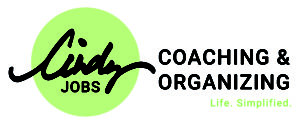“I wish I could be on time more.”
“I wish I didn’t forget things.”
“I wish I could stop disappointing people.”
“I wish I knew where to start.”
“I wish people understood how hard things are for me.”
I know I’ve uttered the words “I wish” followed by any number of things I wanted to change in my life. I’m betting you have too. But wishing things to be different isn’t enough. Change is difficult and takes awareness, understanding, and accountability.
My clients (most of whom struggle with ADHD) come to me with any number of “I wish . . .” statements. They’ve had years of challenges and are now at a place where there want or more accurately need, to make changes in their lives before they lose a relationship, a recent promotion, or even their job.
Why is making a change so difficult? Sometimes we can’t get down to the nitty-gritty reason we want to make the change, so it loses it’s importance to us.
Connecting to the “why” of the change helps associate it to our values. Sure, wanting to be on time makes sense to nearly everyone, but finding the “why” behind wanting to be on time is a bit more granular. Is it because you’re tired of disappointing your kids when you’re late to pick them up from school? Is it because your credibility is at risk when you consistently show up for meetings five minutes late? Or is because you’re wasting time waiting for a later bus or ferry? Whatever it may be, the awareness of the “why” is essential to put perspective around the change.
Next is understanding where the current system breakpoints are is critical to successfully creating change. I’ve found the cause of lateness largely falls into these categories:
- Transitions don’t happen. We’re too involved in what we are doing to realize the passage of time and forget to leave.
- Travel time is underestimated. So many times I hear people say, “Google said it should only take 15 minutes to get there, but I was 10 minutes late.” Yes, but Google is not factoring in long it takes to find your keys, put on your coat, lock the door, back out of the garage, find a parking spot at our destination and transit from your car to whatever office you are supposed to be in.
- “I’ll do just this one more thing.” I’m betting this sounds familiar. I know I’m guilty of this one. We think we have time for one more quick project, but one turns into two or three, and none of them turn out to be quick.
What to do about it?
- If transitions are the challenge, create reminders that it’s time for transition. My personal favorite is the Time Timer. However, any number of timing devices will work. An additional suggestion is to set a timer in a place where you have to move to turn it off physically. Turning of the reminder on your phone is pretty easy, but having to get up and turn off a reminder across the room also creates a physical transition.
- If travel time is the challenge, I suggest people add at least ten minutes on either side of their trips. Ten minutes is generally enough time to gather your things and get on the road, and enough time to find a parking spot and transition to wherever it is you need to be on the other end. Arriving early to a destination reduces stress, plus you may be able to take in a few minutes of meditation, return some calls or knock off any number of other things on your to-do list.
- If “I’ll just do this one more thing” is your challenge, then managing expectations is the key. Most people significantly underestimate how long a task takes. Determining the priority (task or promptness) and utilizing transition devices will help curb the challenge of engaging in just one more thing. Also, think about whether that “one more thing” can be done at your destination. Can you return phone calls or e-mails, review the quarterly numbers, or create tomorrow’s to-do list at your destination? If so, take those projects along with you.
Changing chronic lateness is a challenge, but once you can connect to the awareness of why the change is important and an understanding where the breakpoints in your system are, being on time gets a little easier.
Then there is the accountability piece. If you have a trusted colleague, friend, or family member, think about asking them to be an accountability partner around your intention to not be late. I’m not suggesting they punitively criticize you when you are late, but moreover, point out the frequency and duration of your lateness and share the impact it had on them. Sometimes time blindness is so strong that we aren’t even aware that we are late and are unaware of the impact it has on others.
Using the awareness, understanding, and accountability model can help turn “I wish” (I could be on time more) statements into “I am” (on time) statements.
Cindy Jobs
Looking for more information?
Click here for 15-minute organizing tips.
Click here to schedule a complimentary breakthrough session.
For more helpful information, follow me on Facebook.



Attention Deficit Disorder Association
National Association of Productivity & Organizing Professionals, Seattle Chapter
International Coach Federation
Institute for Challenging Disorganization
Level I Certificates earned in Chronic Disorganization; ADD; Client Administration; Time Management; Mental Health; and Hoarding.
Level II Specialist Certificates earned in Chronic Disorganization and ADHD.







